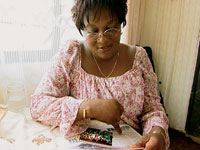
Grades 7-12, College, Adult
Directed by Kim Hopkins
Produced by Television Trust for the Environment
DVD Purchase $195, Rent $45
VHS Purchase $195, Rent $45
US Release Date: 2006
Copyright Date: 2005
DVD ISBN: 1-59458-585-7
VHS ISBN: 1-59458-584-9
Subjects
African Studies
Anthropology
Developing World
Economics
Geography
Globalization
Health
Humanities
Millennium Development Goals
Sociology
United Nations
Awards and Festivals
Honorable Mention, Columbus International Film & Video Festival
American Public Health Association Film Festival
The Great Health Service Swindle
Reversing the brain drain in doctors and nurses from developing countries.
 |
"The visual impact of the gripping documentaries in the Life 5 series make them extremely powerful teaching tools." Dr Jeremy Sarkin, Visiting Professor of International Human Rights, Tufts University |
For over forty years there's been a trickle of Ghanaian nurses to the English-speaking developed world. One widely quoted source says almost two thousand nurses left the country between 1995 and 2002. The exodus is set to continue as nurses opt to leave a crumbling health system to earn more abroad. In the UK, some nurses can earn more in a day than they could in a month back home.
Spending on health in Ghana has gone up but its value has declined. In 1990 it was $4.5 dollars per person per year. In 2004 the figure was $13.4 dollars. However, inflation means that Ghana is spending less in real terms per person. Most of that money goes to wages. For almost everything else, patients have to pay because the health service operates on a "user pays" principle, the so-called "cash and carry" system. The stresses of this system is one reason health workers leave.
The other titles in the series are:
1. Roma Rights - Breaking the cycle of Roma poverty and persecution.
2. School's Out! - Is the private school option better in a Lagos shantytown?
3. Srebrenica - Looking For Justice - Examines the massacre at Srebrenica on its 10th anniversary.
4. Killing Poverty - Has the corruption in Kenya lessened under its new president?
6. The Donor Circus - Zambia tries to change the conditions for international aid.
7. For Richer, For Poorer - In Brazil the gulf between the rich and the poor is one of the biggest in the world.
8. Kill Or Cure? - India's $4.5 billion dollar pharmaceutical industry that serves the world's poor is at a crossroads.
9. The Silent Crisis - The Central African Republic struggles to avoid economic and social chaos.
10. Cash Flow Fever - One in ten people on the planet either send or receive money from abroad.
11. Back In Business? - After 11 years of civil war, can Sierra Leone expect tourism to improve the economy?.
12. Kosovo - A House Still Divided? - Resentment and property ownership issues remain as the UN Housing Property Directorate Mission ends.
13. Trouble In Paradise - Local inhabitants of the Maldives wait for promised tsunami aid.
Reviews
"The visual impact of the gripping documentaries in the Life 5 series make them extremely powerful teaching tools for university, and indeed, other classrooms. In succinct episodes they raise and contextualise some of the most critical issues in the world today. These episodes are produced in an extremely objective manner and allow an audience easily to come to grips with an array of complex problems. They ought to be an indispensable part of the teaching curriculum."
"The importance of these films is that they are intended to raise awareness about global issues in young people, and can be used by anyone for this purpose. The quality of the films is excellent. They are documentaries about the U.N. Millennium Development Goals and include brief interviews with people who are actually involved in MDG programs, from various institutions and from the grassroots to executive level...The objective evidence about the current global crisis of insecurity, poverty, gender inequalities, environmental degradation, and lack of international cooperation is presented in a way that is both realistic and non-inflammatory.